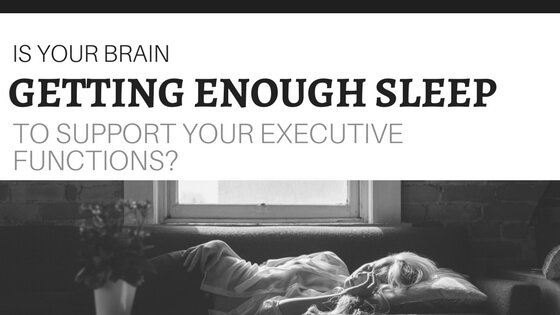Tip #15: Sleep
The brain needs sleep. Getting enough sleep is critical for executive functioning. Typical adults need between seven and nine hours of sleep a night. Children and adolescents do best with eight to ten hours.
Unfortunately one-third of Americans are sleep deprived, getting less than seven hours a night. The Wall Street Journal recently reported that sleep deprivation increases the risk for diabetes, obesity, high blood pressure, and other health problems. I remember reading that if you have five hours or less of sleep and drive a car, your reflex responses are equal to driving drunk. Think about that!
How does Sleep Affect our Executive Functions?
For the time-challenged getting enough sleep is a real problem. Because we tend to do what is directly in front of us, we will keep going and going and going, forgetting to go to bed. The solution is to write down your bedtime and stick to it.
To lead my productive and balanced life I jealously guard my sleep. I do so by having a set bedtime, between 9:30 and 9:45 PM. Since I rise early to get in my exercise, I have to go to bed on the early side. I’ve learned that screen time—TV or computer— affects the development of the melatonin needed to fall asleep. So I’ve trained myself to get off the computer or stop watching TV by 8:30 PM. This helps me get to sleep on time and stay asleep.
Waking up in the middle of the night, is another problem. Many people wake up around three o’clock in the morning, a very common time due to our natural sleep cycles. If you find yourself beginning to lie awake at that hour a good strategy is to get out of bed and read for no more than twenty minutes. Set your timer. Read something neutral or almost boring. This is not the time for steamy romances or a page-turner mystery. After your twenty minutes of reading go back to bed. Sometimes I make a cup of warm milk with a bit of vanilla and a tad of sugar which also seems to help me get back to sleep.
There are many resources, both books and online, to learn about how to set up good sleep habits. A friend found Rest Assured: Self-Healing for Insomnia and the Stress of Life by Michael Krugman to be very helpful. Krugman also has a audio self-help kit. My health plan from Kaiser Permanente offers a free online course for members which I found very informative and useful. If you have an adolescent, most of whom are very sleep deprived, I recommend Snooze or Lose: 10 “No-War” Ways to Improve Your Teen’s Sleep Habits, by Helene Emsellem.
Start improving your sleep habits tonight by writing down on your day plan the time you are going to turn out the lights. Then, in the hour before climbing into bed, let your brain get sleepy by avoiding screen light. Do something mundane like emptying the dishwasher or folding laundry. Celebrate the difference in how you feel with eight hours of sleep. You’ll see improvement in your executive functions.


